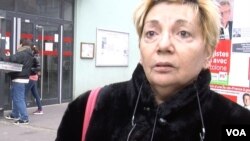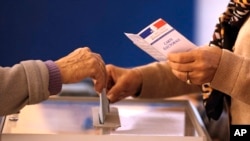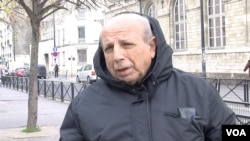France’s center-right emerged ahead in initial results of regional elections, beating back a surging far-right, one month after the Paris terrorist attacks by Islamist radicals.
Early results show the Republicans party of former President Nicolas Sarkozy and his center-right allies leading in seven out of 13 French regions, including the Ile de France area of Paris and outlying suburbs. The ruling Socialists and other leftist parties captured at least five. Nationalists won in Corsica.
After leading in six regions during the first round of voting last week, the anti-immigrant, anti-European National Front failed to capture a single region. But the party’s strong showing - earning one-third or more of the vote in some regions - underscores its steady gains in recent years, including in March local elections and last year’s European Union ones.
“The danger of the far-right has not diminished, far from it,” Socialist Prime Minister Manuel Valls said Sunday night. “I have not forgotten the first round (of the regional vote) and previous elections.”
Sarkozy echoed the warning in his own address to supporters. "We must now take the time to debate the fundamentals of great questions that are anguishing the French,” he said.
In the working class Paris suburb of Aubervilliers, home to many Arab and African immigrants, Maria del Carmen cast a ballot for the ruling Socialist party.
“I’m not for the National Front,” she said. “It’s fascist. No, no, no, no.”
Terror attacks still loom large
While the town voted left, the Front still scored second place in the first round of voting, mirroring other gritty Paris suburbs where its law-and-order message has resonated, especially after the November 13 attacks in the French capital.
Memories of the carnage still haunt French-Algerian retiree Djalil Kaouti, who cast his ballot for the left.
“It’s really awful what happened,” he said. “Most of the victims were young and it really hurts.”
Kaouti said the far right does not reflect the multi-ethnic country he now lives in. “The National Front has no answers,” he said. “Maybe in terms of security issues. But not economic ones.”
Many voters disagree. The Front consistently ranks as France’s most popular party, suggesting major mainstream parties may have a tough battle ahead of the 2017 presidential vote.
Still, analysts say, it is a work in progress.
“The National Front has a hard time affirming itself as a party in power,” political analyst Pascal Perrineau told French radio following the results. “It shows the amount of work that remains for the National Front, which remains still strong, can sculpt and refine its image as a party in power.”
Last month’s terrorist attacks have only helped to solidify the Front’s message that France must pull out of the European Union, reinforce security and send immigrants and asylum seekers back home.
Right still on rise, party insists
Speaking to supporters Sunday night, National Front leader Marine le Pen denounced “campaigns of calumny and defamation” by mainstream opponents bent on defeating her party. She ended up losing the Nord-Pas-de-Calais-Picardie region she was running in, despite leading in the first round of voting.
But, Le Pen said, the election confirmed the Front’s “inexorable mounting, election after election.”
For the center-right Republicans, the results offered a mixed message. The opposition Socialists had urged supporters to vote for the center-right in areas where they had little chance of winning.
“I can’t forget the results of the first round. They hit like a thunderclap,” said Xavier Bertrand, the Republicans candidate who beat out Le Pen. “Without a doubt the last thunderclap before, one day perhaps, the National Front comes to power.”
Since taking over the helm from her father Jean-Marie in 2011, Marine le Pen has sought to give the Front a friendlier, more mainstream face.
The new look is also captured by Jean-Marie le Pen’s granddaughter, 25-year-old Marion Marechal-Le Pen. France’s youngest deputy headed the party’s list in the southeastern Provence-Alps-Cotes d’Azur region and was also ahead in the first round of voting. She ultimately lost to the conservatives in the second round.







